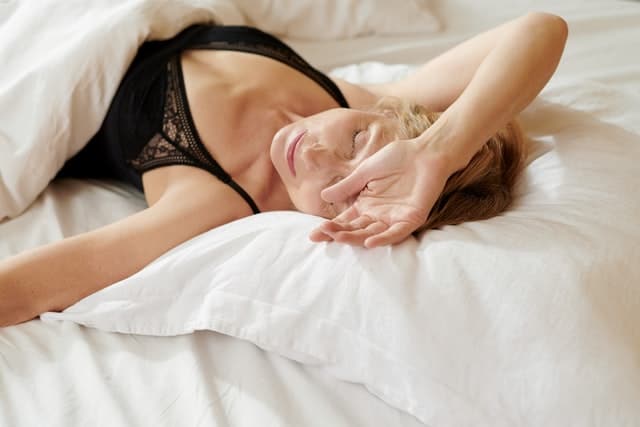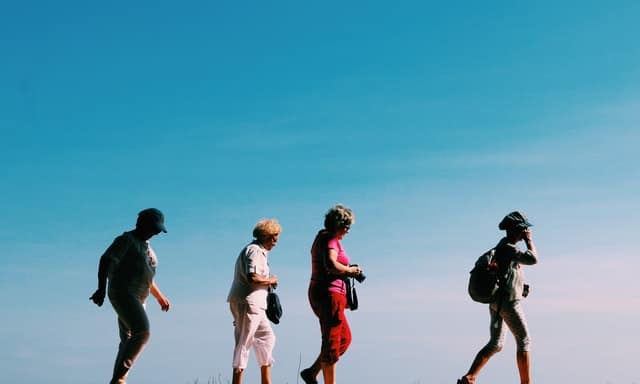Is your sleep deteriorating as you age?
There is a holistic link between lifestyle, nutrition, and the ageing process. The UK’s National Health Service recommends eight hours a night because consistently getting less can have the following mental affects:
- Brain fog.
- Fatigue.
- Inability to concentrate.
- Irritability.
We can get away with a night or two of bad sleep, but consistent lack of sleep can cause us to feel low, anxious, or depressed. We can also become prone to serious health conditions such as obesity, heart disease, high blood pressure and diabetes with prolonged sleep debt.
This article does not cover conditions such as sleep apnoea, but it can give you insight to a better night’s sleep.
I have not had eight hours in years – are you kidding me?!
There are many environmental factors that could be contributing to your sleep issues, but before we get on to those, let’s look at melatonin.
Melatonin levels decline gradually over the life-span and may be related to lowered sleep efficacy, very often associated with advancing age, as well as to deterioration of many circadian rhythms.
Melatonin is the hormone that helps you get to sleep and is fundamentally linked to your circadian rhythm, which is your bodies natural way of knowing what time of day it is. Whilst melatonin seems to decline with age, there are way in which we can better manage our circadian rhythm, such as:
- Get up at the same time each morning, ideally with the sunrise.
- Go to bed when you are tired but avoid afternoon naps.
- Do not go to bed if you are not tired yet.
- Exposure to natural light in the morning – take a quick walk.
- Get outside during the daytime to help your body clock know what it is.
- Wear blue light blocking glasses.
- Meditate in the evening.
- Do not look at your phone, TV, or computer for the last hour prior to bed.
If it is not realistic to achieve some of these, I would highly recommend blue light blocking glasses because these reduce eye strain and prevent your circadian rhythm from being tricked. Without blue light glasses, your eyes are likely looking at a screen, which is telling your body ITS NOON, BE AWAKE. See the issue? You are likely overstimulated.
What other lifestyle adaptations can I make?
Getting to sleep is also about reducing caffeine intake and managing stress. When it comes to stress, one of the most effective ways to reduce stress is to exercise. So, get on that treadmill, go the gym, or go out for a walk. Your mind will thank you for it. In fact, getting outside in a natural environment helps the prefrontal cortex with attention fatigue, and has been show in multiple studies to enhance levels of creativity. By allowing your brain to rebalance, you are giving yourself a fighting chance of winding down in a healthy way.
Avoiding alcohol and cigarettes may enhance the quality of your sleep.
- Alcohol slows down your nervous system and indeed may help you doze off. The benefits do not last however because alcohol disturbs sleep patterns, you’ll probably wake to go to the toilet, and you’ll have a hangover, all leaving you feeling drowsy in the morning.
- Cigarettes are often smoked because smokers feel like it helps them relax. When it comes to sleep, we need to remember that cigarettes contain nicotine which is a stimulant. So, if you do smoke, try to avoid doing so in the evening.
Improving your sleep environment
- Invest in a comfortable mattress, supportive pillows, and cosy sheets.
- Make sure your bedroom is the right temperature so that you do not wake up.
- Darken out your bedroom as much as possible (this aides your body’s natural melatonin production).
- Consider earplugs if you cannot control the noise.
- Make your bedroom a sacred space, by using your bedroom for intimacy and relaxation only.
OK – I will try all of that, but I think I still need help.
Melatonin supplementation can be especially relevant as you age, for the reasons highlighted in this article. Look at what PubMed have to say…
Because melatonin is a potent free radical scavenger, its deficiency may result in reduced antioxidant protection in the elderly which may have significance not only for aging per se but also may contribute to the incidence or severity of some age-related diseases.









